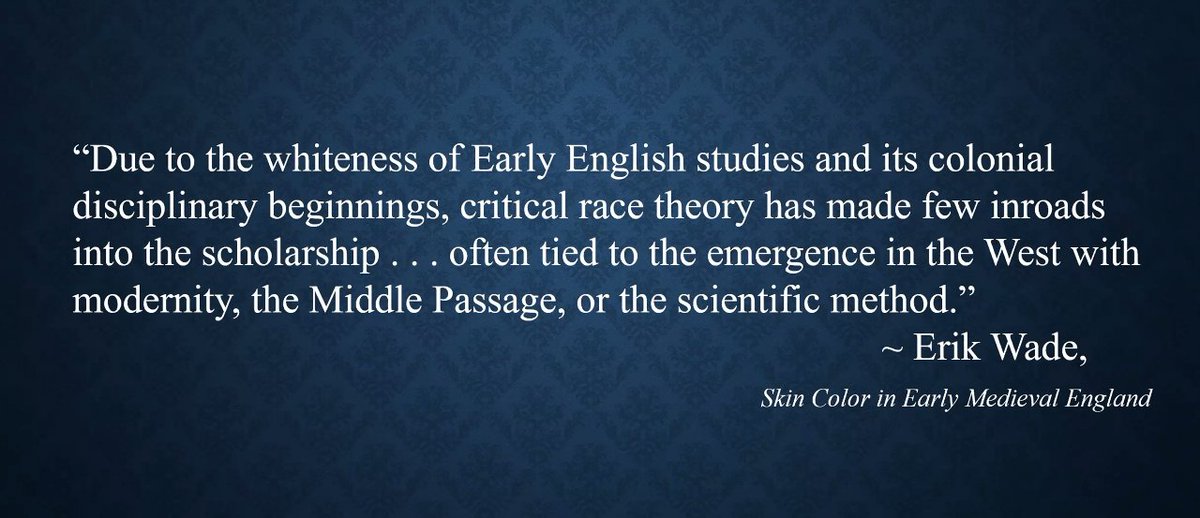
Attending @ISASaxonists' talk for the Early Medieval Identities series. I have officially been given permission to livetweet the talk. #MedievalTwitter 

Lol, and my internet just dropped the talk. Reconnecting!
I'm seemingly back. Fingers crossed. Thank goodness the talk is being recorded.
They are introducing Dr. MRO right now.
They are introducing Dr. MRO right now.
Topics is "Riddles in the Dark: Hadrian's Lost Contributions to Early Medieval England."
MRO starts by stating that the last 7 or so weeks have been busy w/racism & "know your place" aggression in the field.
Said people who don't know about this should ask why they don't.
MRO starts by stating that the last 7 or so weeks have been busy w/racism & "know your place" aggression in the field.
Said people who don't know about this should ask why they don't.
Part of the reason today that Dr. MRO's talk on Hadrian will be shorter than expected is bc she has been dealing with this for the last two months. Unlike white scholars, BIPOC scholars have this extra burden and pressure interfering with their ability to do work.
White scholars have the privilege of publishing without racism affecting one's time, mind, & thoughts.
Discusses the namechange of ISAS, her resignation from it, and that the org has, to this day, not reached out to MRO or BIPOC scholars who left.
Discusses the namechange of ISAS, her resignation from it, and that the org has, to this day, not reached out to MRO or BIPOC scholars who left.
ISSEMES reaches out to senior scholars but not BIPOC scholars.
The current exec director of the org even told a BIPOC scholar that the scholar built her career on false accusations of racism.
The current exec director of the org even told a BIPOC scholar that the scholar built her career on false accusations of racism.
While orgs like this have held conferences recently, BIPOC scholars have dealt with severe racism, anonymous slurs, etc. (see here:
The fear that the org's name-change may be window-dressing seems to be right.
https://twitter.com/ISASaxonists/status/1407565569902137349)
The fear that the org's name-change may be window-dressing seems to be right.
This "know your place" aggression isn't working, isn't silencing BIPOC scholars speaking up about racism.
Dr. MRO will not stop speaking up.
She asks "What sort of field is this? We are a mess." BIPOC scholars carry the burden of pushing the field forward & making it relevant
Dr. MRO will not stop speaking up.
She asks "What sort of field is this? We are a mess." BIPOC scholars carry the burden of pushing the field forward & making it relevant
Riddle yourself: how are YOU working to make systems better? Are you stepping aside and giving platforms to marginalized peoples?
Giving platforms to Black people in the theme of this talk.
Thus, we turn to Hadrian.
Giving platforms to Black people in the theme of this talk.
Thus, we turn to Hadrian.
What drew Dr. MRO's attention to Hadrian was 7th-century Bede's description: "vir natione afer" [the man by nation of Africa/the man of African race].
Bede & Hadrian contemporaries, both alive at the same time.
Bede & Hadrian contemporaries, both alive at the same time.

W. E. B. DuBois, Margo Hendricks, Kim Hall, Geraldine Heng, Jacqueline de Weever, etc, have brought light to questions of race in early medieval England.
Dr. MRO notes that (white) scholars have repeatedly gone through the effort of explaining that Hadrian *must* have been from North Africa and could *not* have been dark skinned.
This is an attempt to isolate Black Africans from "histories of global significance."
This is an attempt to isolate Black Africans from "histories of global significance."
Most scholarly consensus is that Hadrian was from Libya, but Dr. MRO looking into where in it Hadrian may have been from. Thinks he may have been from closer to the Egyptian border, which some scholars want to move him away from (and from the Sudanese border)
Hadrian--also known as Adrian--was born in the 620s in North Africa. MRO is in preliminary stages of trying to identify his homeland.
Dr. Erik Wade hypothesizes Egypt (and he might be right, but we shouldn't tell him).
Dr. Erik Wade hypothesizes Egypt (and he might be right, but we shouldn't tell him).
Hadrian moved to Naples due to Arab invasions. He became an advisor to the Byzantine Emperor, then eventually introduced to the Pope.
He is often seen as part of a team with Theodore (both pictured here) but often marginalized compared to him.
He is often seen as part of a team with Theodore (both pictured here) but often marginalized compared to him.
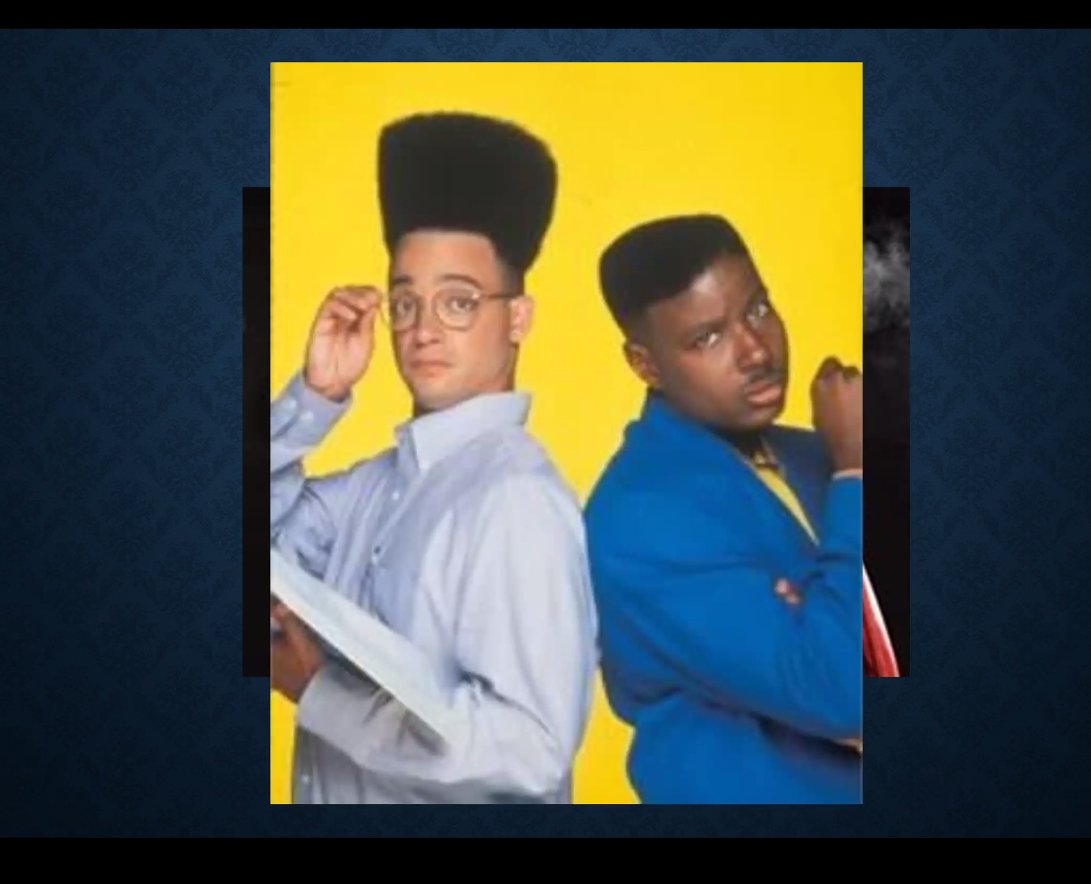
Hadrian is offered the archbishop seat of England. Turns it down, suggests someone else, who turns it down, then suggests Theodore, who accepts as long as Hadrian comes with him.
They journey to England, have Hot Boy Summer, Theodore sets sail to England, but Hadrian detained
They journey to England, have Hot Boy Summer, Theodore sets sail to England, but Hadrian detained
by a suspicious mayor concerned that Hadrian represented a plot by the Byzantine emperor. He was eventually cleared to travel and joined Theodore in England.
There they taught ecclesiastic & secular knowledge to crowds of people, including law, Greek, & medicine.
There they taught ecclesiastic & secular knowledge to crowds of people, including law, Greek, & medicine.
Theodore was first archbishop obeyed by all England.
They helped established English cultural identity.
We don't have much original work by them but we have Hadrian's student Aldhelm, classroom notes from their students, etc.
They helped established English cultural identity.
We don't have much original work by them but we have Hadrian's student Aldhelm, classroom notes from their students, etc.
Hadrian introduced Aldhelm to the African riddler Symphosius (an anonymous name meaning something like "Party-Boy"), suggesting African influences on the famous OE riddle tradition. 
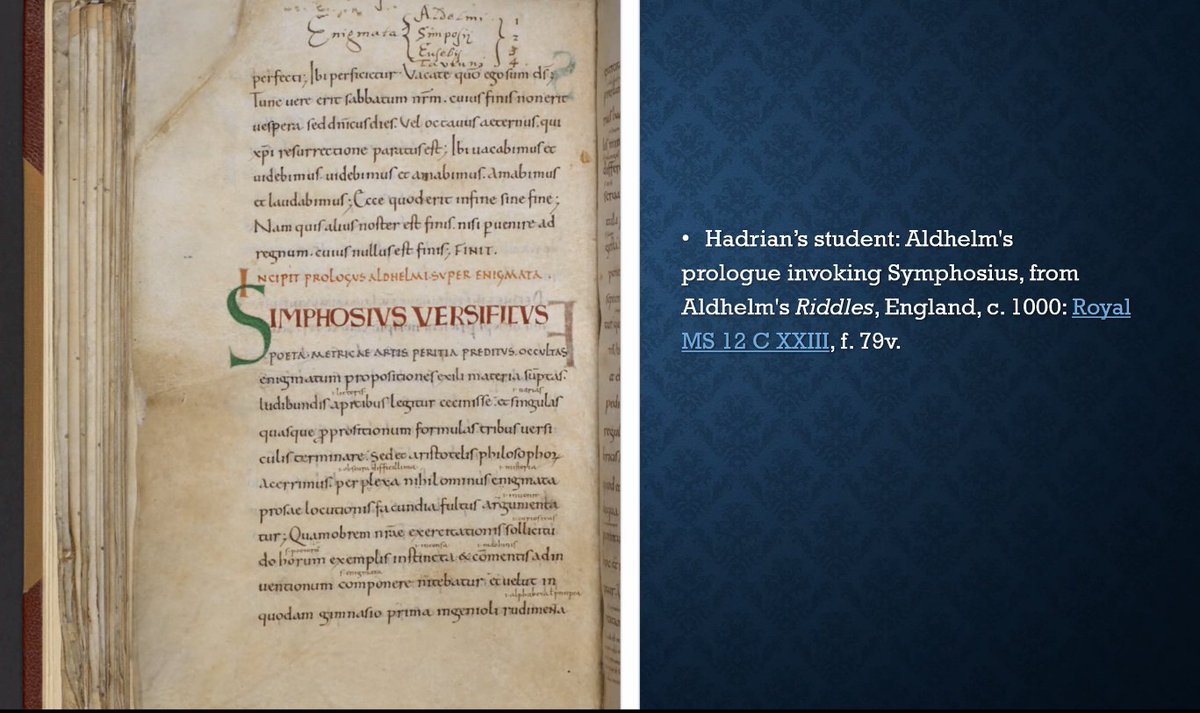
In Hadrian's words from the Biblical commentaries attributed to him & Theodore, he references a Libyan bird that he may himself had seen. One of the birds Hadrian references suggests a southern Libyan origin.
Michael Wood also working on this.
Michael Wood also working on this.
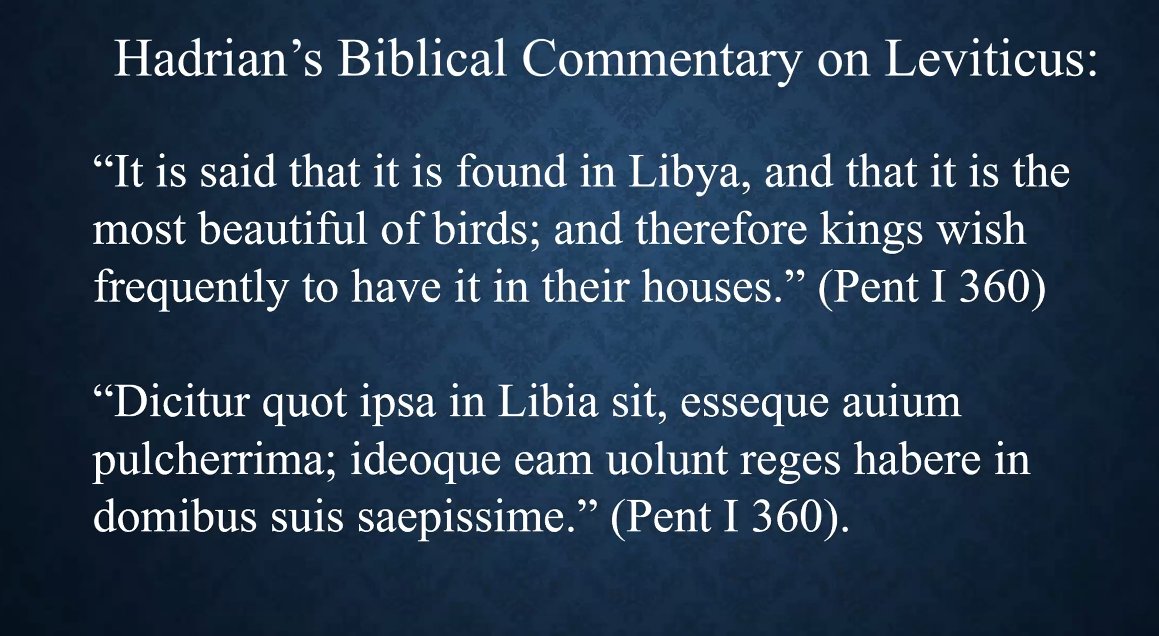
Wood thinks that one of the birds is from the grounds of this palace in Libya.
Wood, who Dr. MRO respects, gave a recent talk on Hadrian that had a fee to attend. MRO suggests that this isn't a condemnation of Prof. Wood but one of the field's investment in racial capitalism.
Wood, who Dr. MRO respects, gave a recent talk on Hadrian that had a fee to attend. MRO suggests that this isn't a condemnation of Prof. Wood but one of the field's investment in racial capitalism.
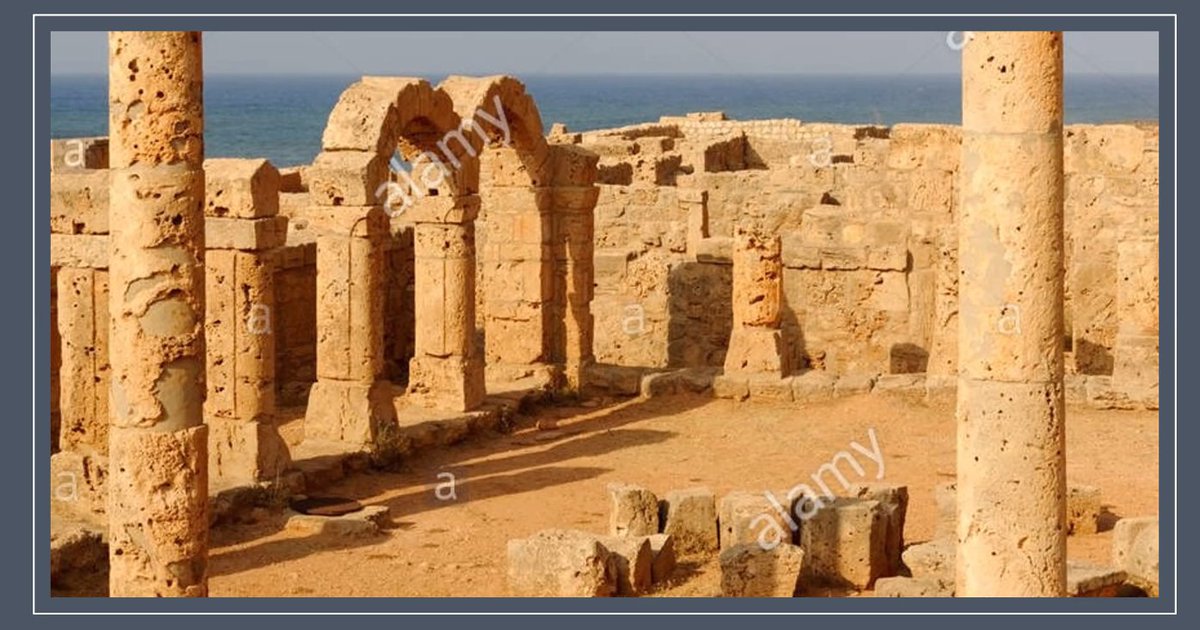
When white male scholars who don't primarily work on Otherness turn to write on it, this is a problem. Needs to ask why they are doing this. Is it an attempt to look progressive?
Notes the tendency to reject outsider perspectives and the idea of foreign influences. Michael Lapidge, for instance, rejected the idea that a Swiss church was based on Syrian churches & was designed by Theodore. This idea was put forward by Günter Noll 
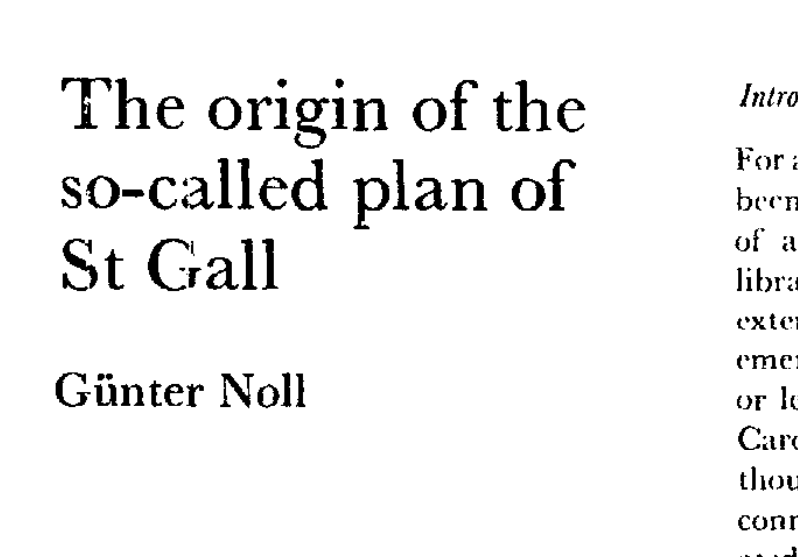
Noll pointed to the racism of previous scholars that ruled out non-white influences in Europe (such as this quote). 
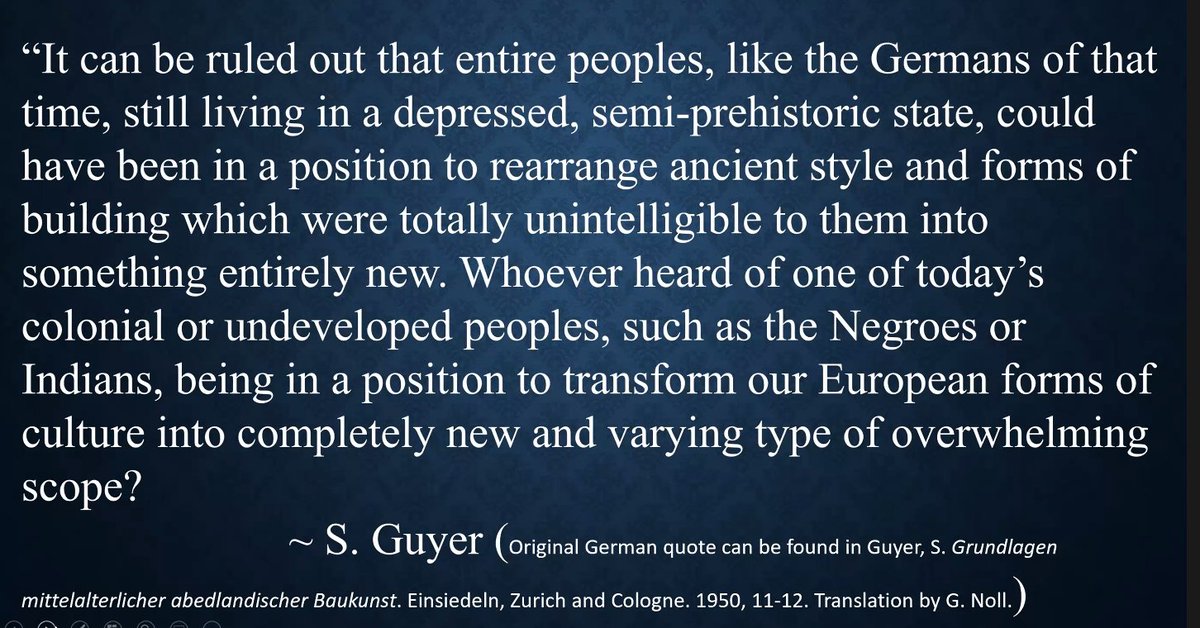
Lapidge's praise for Hadrian and Theodore is clouded by a lack of full acknowledgement of their international influences, instead setting them in a nationalist narrative of *English* development.
Scholars often quick to dismiss the idea that Hadrian could have had a skin color that we wouldn't think of white.
Now MRO quoting some terrible scholar called Erik Wade or whatever. BORING.
Now MRO quoting some terrible scholar called Erik Wade or whatever. BORING.
Stuart Hall's comments on the regime of truth are significant for early medieval English studies, which continues to anchor its narrative in whiteness to emphasize white greatness. 
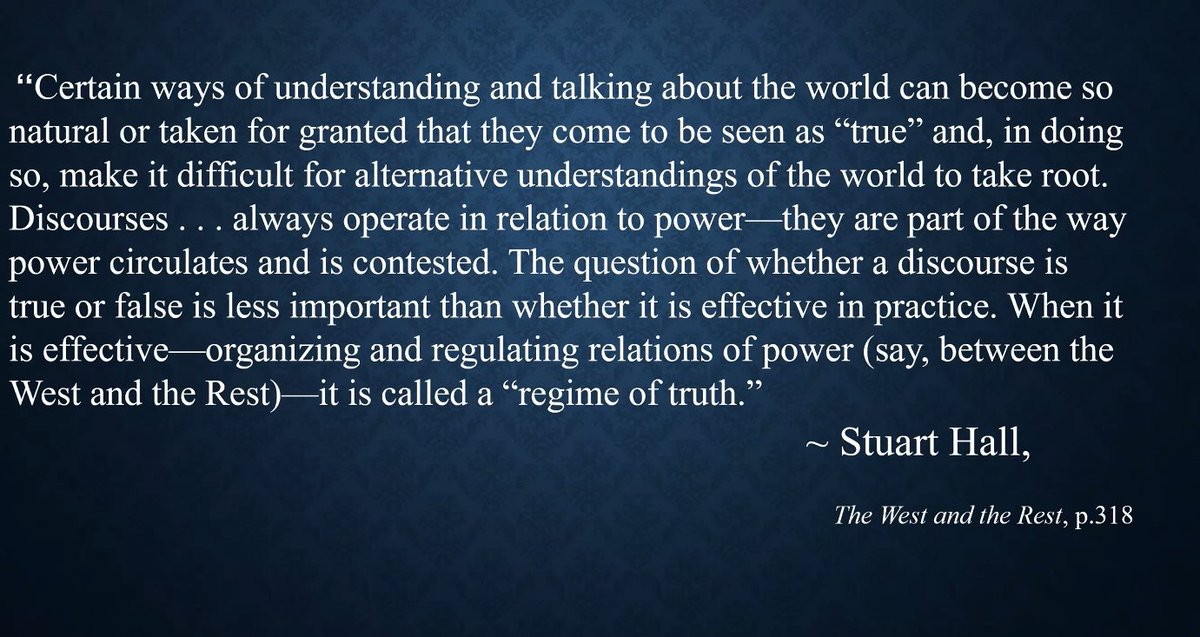
The regime of truth in early English refuses to acknowledge or discuss imperialism, colonialism, or racism.
This piece, by @OdiosDeLunar, represents how Dr. MRO perceives Hadrian. They've both received pushback on such depictions. 

White people have imagined themselves as the progenitors of culture and history, and they fail to imagine the consequences of only imagining white skinned historical figures.
This is not presented to fetishize BIPOC figures in history or scholarship.
Dr. MRO notes this fetishization CAN happen with scholars. When she's quoted in articles, powerpoints, etc, people often present an image of her, unlike with white scholars.
Dr. MRO notes this fetishization CAN happen with scholars. When she's quoted in articles, powerpoints, etc, people often present an image of her, unlike with white scholars.
She quotes @EduardoRamosii on whiteness in medieval studies (from here: link.springer.com/article/10.105… ) 
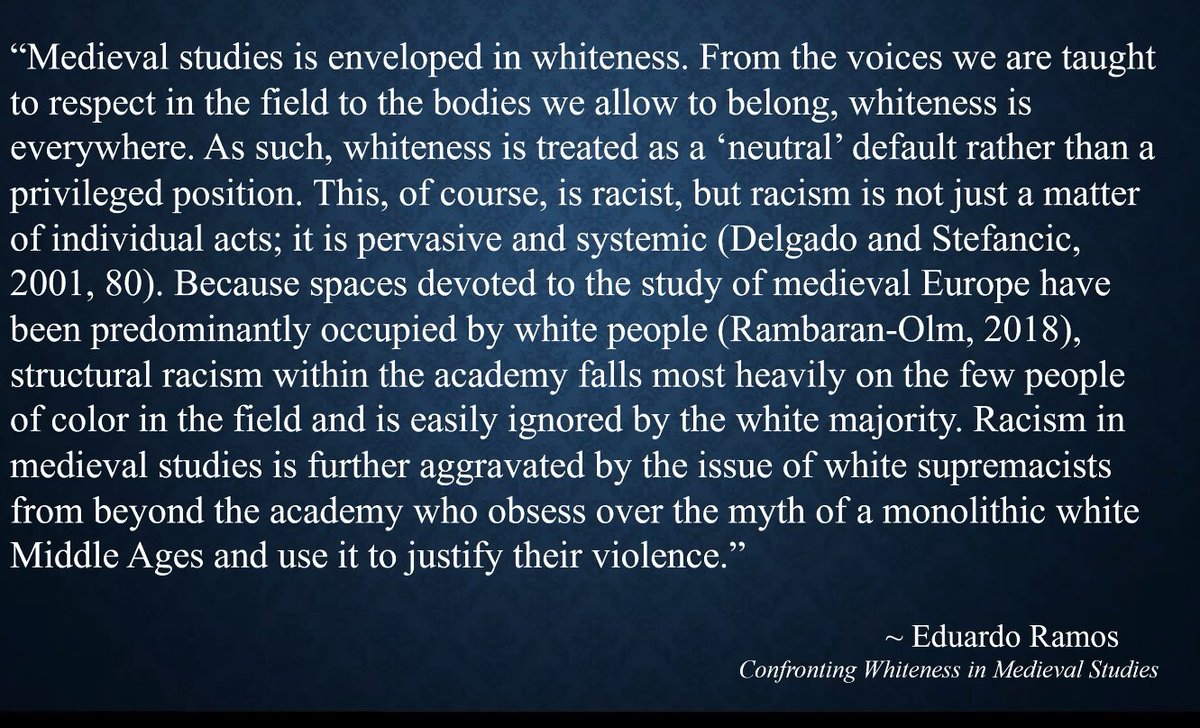
Dr. MRO discusses a story first noticed by Kathy Lavezoo: a young man from the Caribbean who adored much medieval poetry whose South African prof dissuaded him "in a pained tone" from taking a theoretical approach to medieval lit.
The young man was Stuart Hall. The South African prof was JRR Tolkien.
Our obsession with preserving traditional readings has lost us, if not many, at least one intellectual giant.
What might have been if Hall had entered medieval studies?
Our obsession with preserving traditional readings has lost us, if not many, at least one intellectual giant.
What might have been if Hall had entered medieval studies?
How might the field have developed differently if such perspectives weren't dismissed? How might we have read someone like Hadrian if whiteness wasn't such a powerful force in the field?
Toni Morrison, speaking on Beowulf, spoke back to fascism. Another voice erased from the field who might have breathed new life into a dying field. 
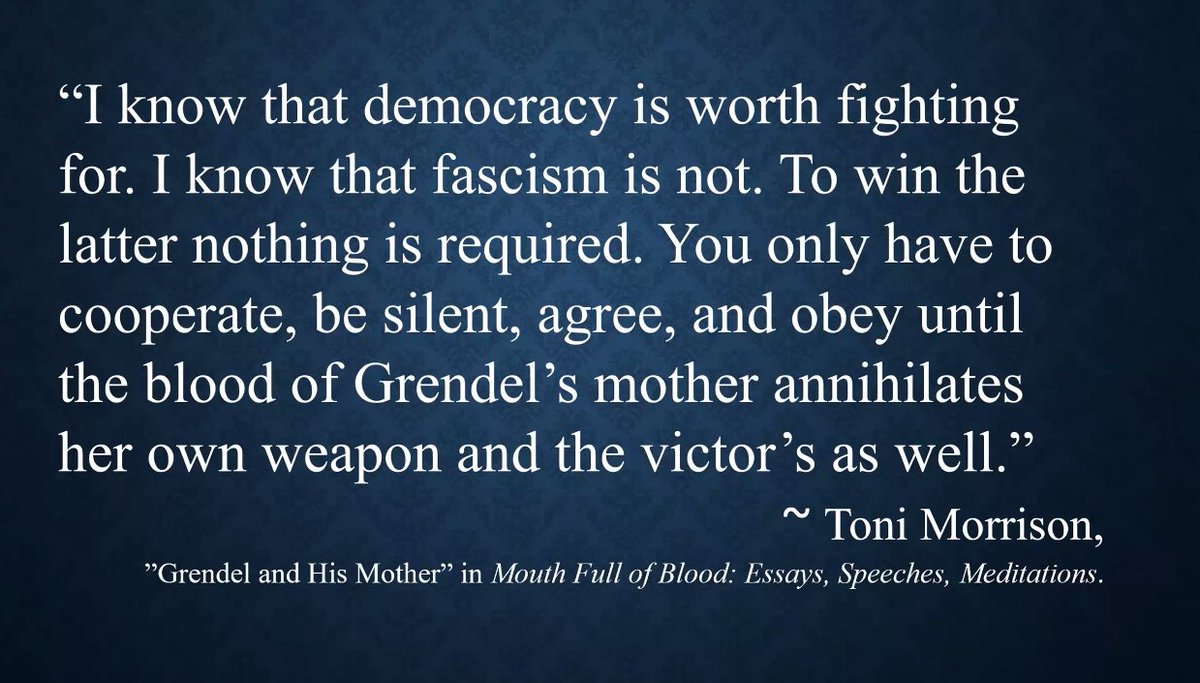
Dr. MRO quotes @slomuto from this essay: medievalistsofcolor.com/race-in-the-pr…
Discusses the impulse to memorialize racist & colonialist figures. Lomuto argues that, as an instructor, it's her job to show students how reverence for whiteness is constructed.
Discusses the impulse to memorialize racist & colonialist figures. Lomuto argues that, as an instructor, it's her job to show students how reverence for whiteness is constructed.
Let's end with some riddles:
Who are we? Who do we let in?
Who are we? Who do we let in?
Hall models how to communicate difficult ideas in an understandable manner. What might he have contributed to medieval studies?
We need to be better antiracist scholars, allies, & accomplices.
We need to be better antiracist scholars, allies, & accomplices.
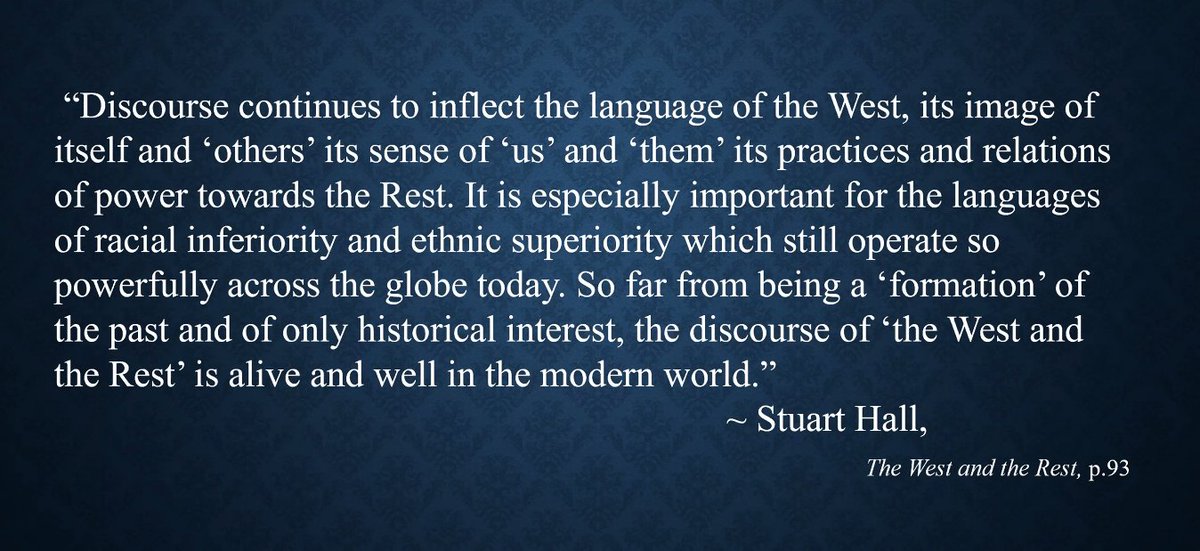
Rather than asking whether Hadrian was Black, ask, "Why are you so uncomfortable with the idea that he might be?"
End of talk.
End of talk.
Q&A has started.
Question about whether Theodore is also racialized at all in works like Bede?
A: Bede describes them as from abroad, describes where they're from. Ofc, Bede's def of race is different from ours. Not the otherness we might attach to it now.
Question about whether Theodore is also racialized at all in works like Bede?
A: Bede describes them as from abroad, describes where they're from. Ofc, Bede's def of race is different from ours. Not the otherness we might attach to it now.
Q: is there anything specific that suggest Hadrian used riddles for teaching?
A: Aldhelm's riddles imply he learned Symphosius from Hadrian.
A: Aldhelm's riddles imply he learned Symphosius from Hadrian.
Q: Hadrian & riddle tradition. Can you expand on the idea he brought African tradition? Is there a relation to the OE Exeter book riddles?
A: We don't know. OE riddles much smaller, more condensed than N African ones.
A: We don't know. OE riddles much smaller, more condensed than N African ones.
Q: do we move forward by dismantling the British story or by refocusing on non-European stories?
A: We should do both. We do need to decenter England (and she says this as someone working on England). We need to hear other voices
A: We should do both. We do need to decenter England (and she says this as someone working on England). We need to hear other voices
Q: How should we reimagine the period in the classroom?
A: Decentering whiteness is important. Move away from traditional readings. You can bring in other perspectives. Indigeneity and Beowulf, for instance. Bringing in new readings breathes life into the field.
A: Decentering whiteness is important. Move away from traditional readings. You can bring in other perspectives. Indigeneity and Beowulf, for instance. Bringing in new readings breathes life into the field.
We need to read outside of the field.
("this is one reason our book is taking so long" -- lolSHRIEK, this is accurate)
("this is one reason our book is taking so long" -- lolSHRIEK, this is accurate)
Q: Are they antiracist and/or BIPOC scholars in early medieval studies that people should be reading?
A: First, this list: mrambaranolm.medium.com/race-101-for-e…
A: First, this list: mrambaranolm.medium.com/race-101-for-e…
The list above shows how many people working on and discussing the Middle Ages and race have been erased, some of them who worked on medieval topics a hundred years ago.
We ended there. Thanks to Dr. MRO!
We ended there. Thanks to Dr. MRO!
That was fabulous.
The recording will be edited and up online soon.
The recording will be edited and up online soon.
And here's the recording of Dr. MRO's talk! Check it out!
• • •
Missing some Tweet in this thread? You can try to
force a refresh

